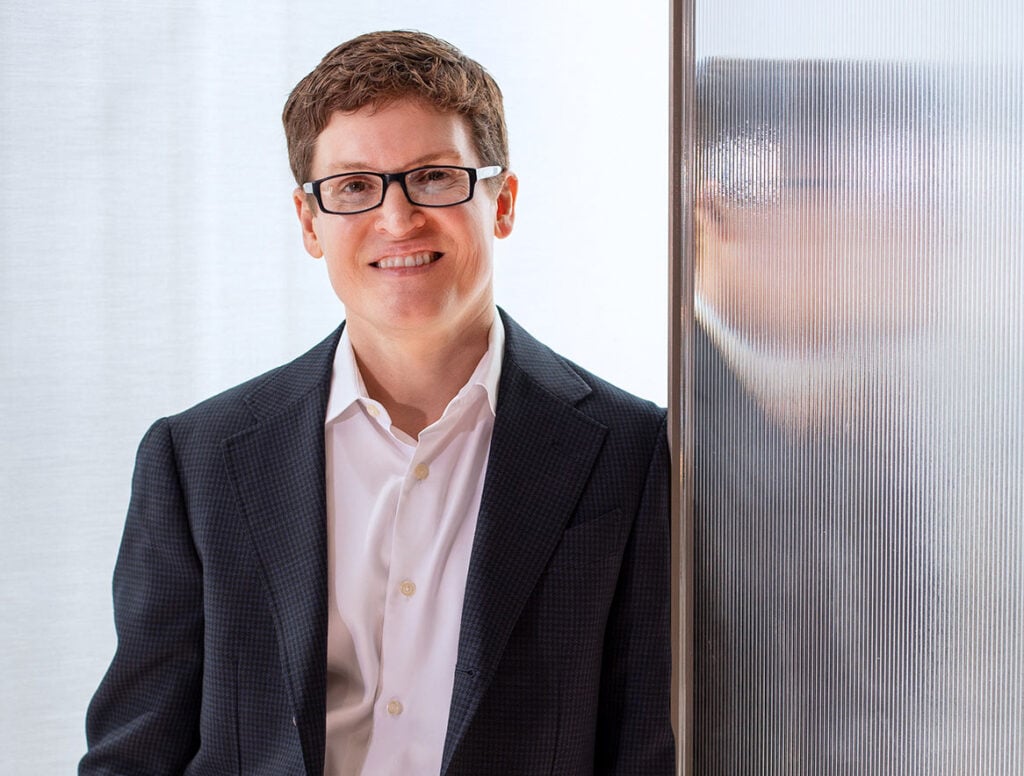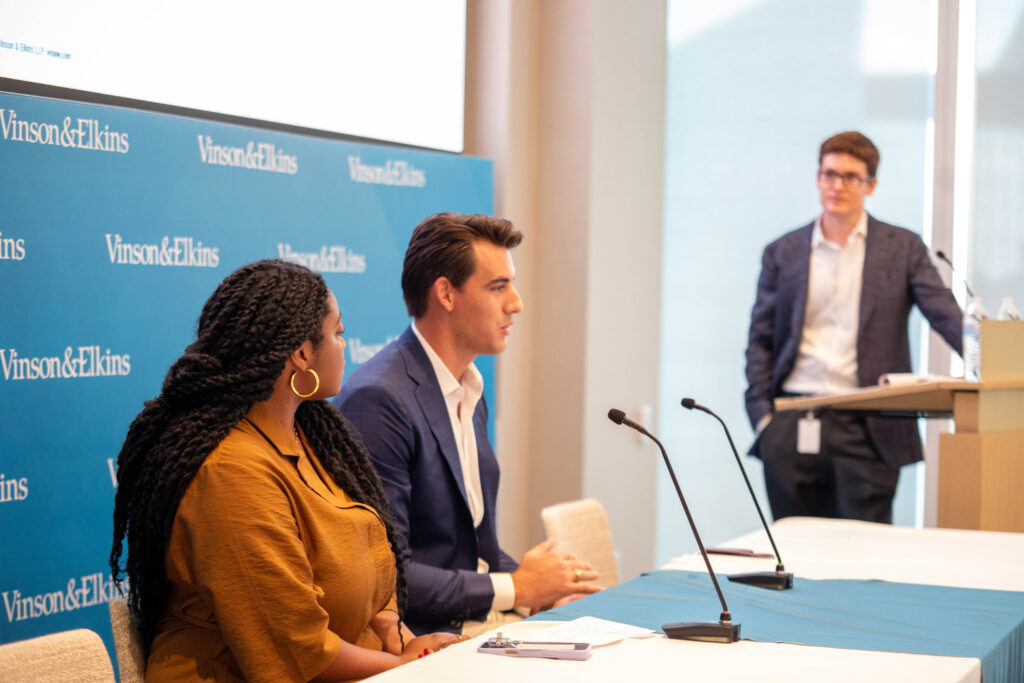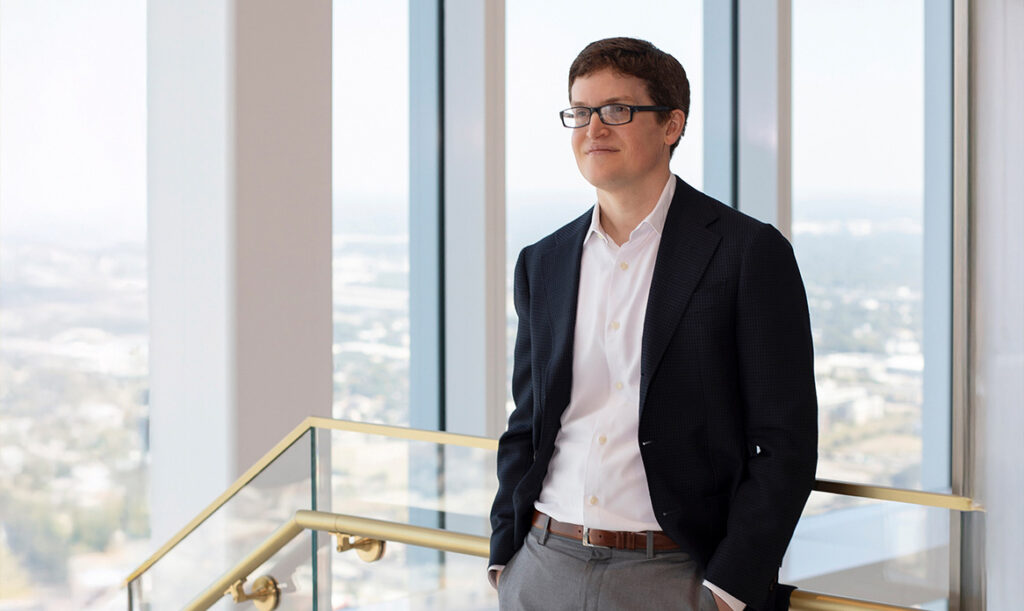Pro Bono at Vinson & Elkins: Lawyers Changing Lives
V&E+ Values

V&E+ Values
Pro Bono Counsel Parker Cragg reflects on a life dedicated to service, returning to Vinson & Elkins, and wisdom he has picked up along the way.

Parker, you rejoined Vinson & Elkins this summer to lead the firm’s pro bono program. Tell us about your approach to the role.
Sure. Vinson & Elkins’ pro bono program has always been a collaborative commitment. But the foundation of its long-term success is at the individual level: Talented, driven lawyers seeking justice on behalf of people in need.
So, when I began thinking about my goals for the program, I made a point to do so through an individual lens. I want to help each lawyer at the firm participate in meaningful pro bono work, and to be an effective advocate while doing so.
How are you working toward those goals?
I see the work in two parts. The first is to be a connector. This entails working with our lawyers to understand the issues they care most about, and connecting them with pro bono clients whose legal needs center on one or more of those issues. The second part is to be a facilitator — essentially, to clear a path for our lawyers to jump into a pro bono matter at the point where they can make the biggest impact.
Sometimes this involves sourcing new matters. Sometimes it involves establishing or strengthening relationships with legal aid providers, or equipping our lawyers with the support and resources they need to be effective advocates. Sometimes it involves managing intake, checking for potential conflicts, or handling myriad administrative tasks.
It probably often involves all of that and more.
It does. There’s always a lot of matter-adjacent work, and the last thing we want is for our lawyers to get stuck in those weeds. So, anything that can simplify the process — anything that can make it easier to serve people in need, and to do so with joy — will always be part of my focus.
You alluded earlier to how personal pro bono work can be. Can a personal connection to a matter sometimes work to a lawyer’s advantage?
For sure — and to the client’s advantage, too. At its core, this work is about meeting people at a moment of vulnerability, and making it your mission to help them through that moment. When a lawyer can connect a pro bono matter to part of their own story, the mission becomes clearer. Focus on it sharpens, and the client relationship deepens. I’ve seen this happen for countless lawyers, including myself.

How so?
There are many examples. For one, my brother-in-law is from Guatemala. He met my sister when she was working there, and — after immigrating to the United States — is now a U.S. permanent resident. Had it not been for my connection to him, I might not have pursued a matter that would end up leading to one of the most meaningful moments of my career.
And that was …
Leading a case in the Fifth Circuit on behalf of an asylum-seeker who, alongside his fiancé, had been persecuted and assaulted by cartel members because he was gay. Our client’s partner had won asylum at his administrative hearing. Yet our client did not — and was deported back to Mexico — even though the facts and law at issue in the two cases were effectively identical.
Fortunately, our team was able to secure a settlement with the Department of Justice to reopen and dismiss the removal proceedings for our client — and ultimately allow him to return to the United States.
Of course, not every lawyer will aspire to be an immigration advocate. But nearly every lawyer feels connected to some cause or another. As I see it, the more that we can connect lawyers with pro bono matters that resonate with them on a personal level, the better they can represent their clients.
There are so many ways to dedicate yourself to service. What convinced you that returning to Vinson & Elkins was the right move?
You know, having grown up in Houston, I’ve long been familiar with the firm’s impact in the local community. Then, as a summer associate and later as an appellate lawyer, I got to learn about the firm’s values more broadly — and up close.
I saw firsthand how seriously we took our charge to deliver excellent work and service. I benefited from a culture that supports professional and personal growth. I appreciated the spirit of collaboration among lawyers and business professionals at every level. And I realized how deeply people at the firm cared for their clients, colleagues, and communities. Really, it’s the ideal environment for a pro bono program to thrive.

Sounds like you didn’t need a whole lot of convincing!
I really didn’t! Don’t get me wrong, though — I loved practicing appellate law. Everything about it. But pro bono work has been integral to my practice since I was a first-year associate, and even then I knew that if an opportunity to dedicate my career to it ever arose, I wouldn’t pass it up.
So, when my husband sent me the LinkedIn posting for this role one afternoon, I drove home from a job I loved, drafted my cover letter that night, and applied the next day. I would have done the same no matter where I was working.
You’re bringing quite a bit of service experience to this job — and not just in law. What have these experiences taught you?
So, so much. Before becoming a lawyer, I taught in a Houston ISD high school, led a nonprofit substance abuse recovery program, and participated in dozens of mission trips with my church. These experiences taught me so many things, but two stand out: the strength and resilience of the people we served, and the life-changing impact that even a small amount of assistance can make.
It must be similar in law.
For sure. Most pro bono clients have faced so much adversity, and they’ve worked tirelessly to even put themselves in a position to benefit from our assistance. They’ve come so far, but they’ve hit a wall. And all they need is a little boost to move forward with their lives.
I’ve seen it time and again over my career, and I can’t stress this point enough: When it comes to navigating the complexities of our legal system on behalf of people in need, any amount of help is worthwhile. Even if you’re just making a single touchpoint at a legal aid clinic, for example, that can change a life.
I’d imagine that mindset is one you encourage at Vinson & Elkins.
Absolutely. Especially for lawyers new to pro bono, it can be easy to doubt your potential to make an impact. I’ve heard people say: “Oh, just showing up at a clinic, how helpful could that really be?” Or even: “I’m not an immigration lawyer. What value could I possibly add to an immigration matter?”
Well, the answers are: You can be very helpful, and you can add significant value. As I often emphasize to associates: Even if your billable work doesn’t line up perfectly with a pro bono client’s needs, your experiences as a lawyer — your ability to navigate complex legal concepts — are more than enough to make a difference.
Powerful stuff. Before we wrap up, any parting wisdom for lawyers who aim to make pro bono work a substantial part of their career?
Keep an open mind. Most lawyers at Vinson & Elkins have a decent idea of what’s meaningful to them and they type of legal work they enjoy. But there’s a lot to be said for exploring new interests, and pursuing the opportunities that doing so often brings.
Whenever I’ve made a point to explore new interests, I’ve been delighted to find that it hasn’t come at the expense of the many other things I’ve long cared about. Instead, my interests — indeed, my knowledge, skills, and experience — have only grown.

So, next time you encounter a pro bono matter that doesn’t look like a perfect fit, jump on it. At a minimum, you’ll help someone in need. More likely, you’ll also begin a new, rewarding chapter in your life and career.
Meet ParkerOffice: Houston | Hometown: Katy, Texas | Law School: Stanford Law School Favorite activities outside work: Family time, playing and watching tennis, singing, playing guitar. One book I loved and why: The Element: How Finding Your Passion Changes Everything, by Ken Robinson. It helped me find my way during one of my many periods of discernment. An underappreciated musician I recommend: Harry Chapin, who wrote beautiful songs about ordinary folks and fought to end global hunger. Best career advice I’ve ever received: “Your students won’t care how much you know until they know how much you care.” A veteran teacher told me that, and she was right. A dream adventure: Scuba diving in the Great Barrier Reef. |
This information is provided by Vinson & Elkins LLP for educational and informational purposes only and is not intended, nor should it be construed, as legal advice.